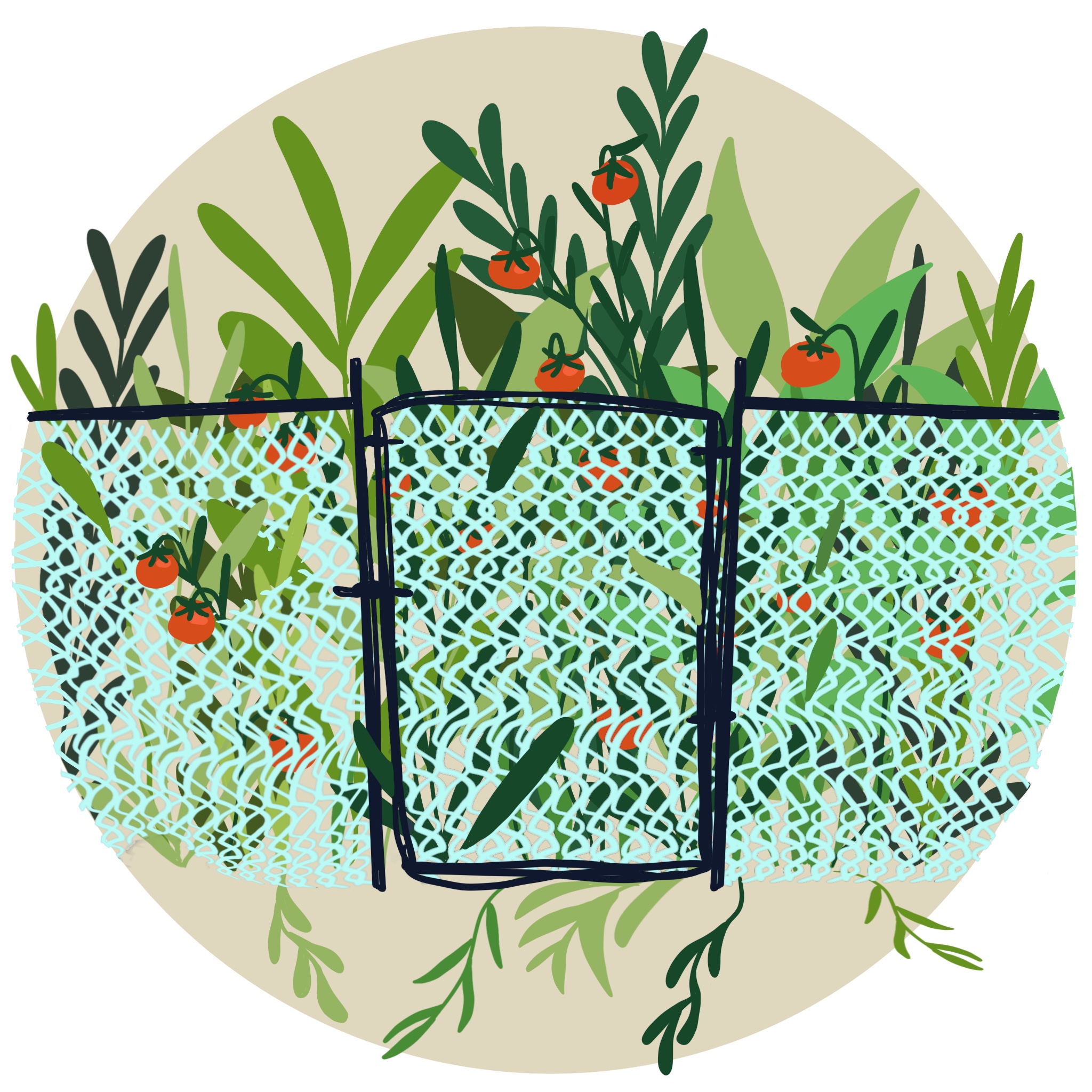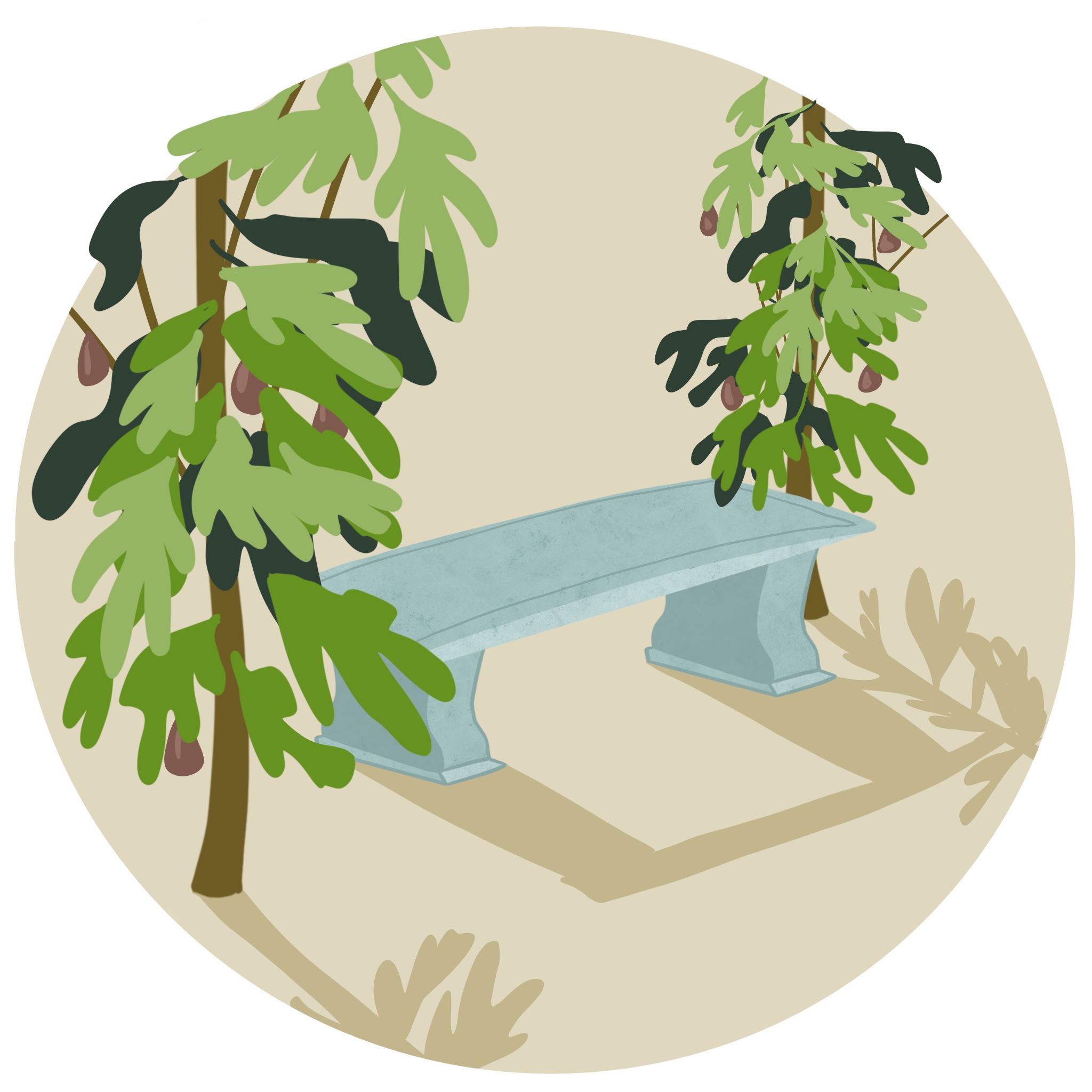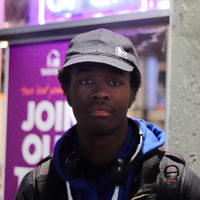
They ran barefoot on the hot summer streets and tried not to step on dandelion thorns that grew in the cracks of the asphalt. The Mayor of 14th St. knew that when the sun licked the dead parts of spring, it was time to crack open the little chain link fence that stood as a barrier between the garden and the sidewalk. The community gathered, sat amongst the zinnias and talked about neighborhood things. Some brought grilled sausages, some brought those ice cream cones you can only find in the freezer section of a corner store. They shared in a collective sigh of relief: that the kids were going back to school in just a couple of weeks, that the beer was chilled, that the world had stopped for a second just for them. The children climbed the branches of the cherry tree that loomed over The Mayor’s doorstep, its branches sculpted like it had been awaiting their embrace. And they squealed as the tomato’s firm skin broke under their teeth, sweet juice dripping down their elbows.
The Mayor loved his tomatoes. Rebecca’s mom liked to say it was because he didn’t have kids and needed something to care for, but Rebecca felt no need to psychoanalyze.
His house was made of frayed toothpicks (the kind that would give you splinters in your gums) and it looked like it could fall under a breeze. The window screens were tattered from years of thick, muggy nights and winter rain, and his front window was covered in a thin coating of impenetrable dust.
He loved to decorate, though he wasn’t much good at it. His Christmas lights always hung limply from the porch cover – bulbs were always burnt out and the colors were scattered. One Thanksgiving, he nailed old Mardi Gras masks to his roof and stacked statues of religious figures on either side of his front door.
Another year he hid his high school football cleats amongst the ferns that lined his porch and hung his childhood participation medals from the branches of the cherry tree. By the end of December, the front of his house became a collection of miscellaneous décor, staples of his existence and symbols of his past life that he showcased to the entire neighborhood. Passersby would gawk at the curated exhibit of eclectic eccentrics. One mother even asked The Mayor if the decorations were seasonally appropriate. The decorations never came down after that.
Next to the tattered floorboards and loose roof shingles stood a garden. The mulch was always spread evenly, wood chips burying the torn paper bags that kept the weeds out. A line of fig trees cast shadows on a stone bench that overlooked the array of reds and greens and yellows. He whistled to himself as he pruned his cherry tree and catered to his fall annuals. He was intentional; he was focused.
Every September afternoon, Rebecca would stumble past his chain link fence and breathe in the remnants of summer. She’d sit on his stone bench and rest her shoulders from the backpack full of empty notebooks and newly sharpened pencils that created a back-to-school arc in her spine.
Rebecca was constantly reminded of the impermanence of the garden, its delicateness and fragility. She envied the structure, how every aspect of the garden served its purpose, how nothing was out of place, a symbiosis that was clear and uncomplicated.
The Mayor loved to talk about his tomatoes as much as he liked to eat them. His knees, unsteady underneath his wobbling hips, creaked as he slowly lowered himself to the stone bench, seating himself next to Rebecca’s unopened backpack. He fiddled with the clippers in his hand, his fingers exposed and raw.
“Those heirlooms were sweeter this year,” he’d say. He never knew how to really make conversation with kids but she appreciated that he tried.
“How’s the school?” he’d ask. Rebecca kept her eyes fixed on the bare fig tree shadowing a pile of freshly pruned branches.
“School’s hard, I guess,” she’d answer, mourning summer’s simplicity.
“Everything is always hard,” responded The Mayor. He wiped his palms on his denim, leaving a smeared handprint of soil on his thighs, and got back to his pruning.
Rebecca liked that about The Mayor. She hated advice from grownups, especially when they thought they were the only ones who ever thought of it like that before.
“You know, if you save the seeds from heirloom tomatoes and replant them, you can get more tomatoes next summer,” said The Mayor. “They’re called heirloom tomatoes because they haven’t been genetically modified or anything. They’re original tomatoes and their seeds just keep getting replanted. Here.” The Mayor picked a handful of seeds from his pocket and listened to them rattle in his fist. “Open your hand,” he instructed. Rebecca did as she was told and he poured them into her hand. A few seeds creeped into the crevices of her palm. “You’ll live somewhere else someday soon. For college or whatever you want to do, really. And now you can have some tomatoes, too.”
Rebecca listened to them rattle and stuffed them into her pocket.
She sat on that bench and she watched and she learned. The sun was burning out earlier and earlier, leaving the neighborhood with cold evenings and a dark and stiff winter.
The Mayor was most consumed with worry during those winter months. He made sure his garden gate was closed and prohibited any neighbors from awakening his spring perennials from their hibernation.
“Bulbs need their sleep, my dear,” he would say.
As the air froze and water crystallized on the windows, well-meaning neighbors would inquire about his garden.
“It’s the cold season. There’s nothing to do but worry,” he’d answer as he cracked his fingers through his leather gloves and stuffed them back into his wool lined pockets. Every year he’d anticipate that the mercilessness of winter wind and rain would uncover his neatly packed beds and expose his spring flowers.
But spring always came, and so did the petunias, the pansies, and the geraniums.
—

The tomatoes had a month left in their season but this year they were ripening early. The vines were browning and the skins were sinking into their soft center. The Mayor spent more time sleeping by the TV than tending to his harvest, leaving his fall nightshades to wilt under the waning autumn sun. Rebecca would sit on the stone bench and watch the overgrowth monopolize the empty garden beds, the weeds strangle what was left of the garden’s growth, hoping for The Mayor to separate from the confines of his home and explain. Why was he allowing his garden to die? The neighborhood kids hadn’t seen The Mayor much that fall. And soon fall began turning to winter. His cherry tree was left untrimmed, and his fall annuals drowned in the unyielding November rains. Winter came and his garden gate was left open.
Rebecca continued to sit on that bench, allowing time to pass as she chewed the possible consequences of confronting The Mayor. Letting the garden die just didn’t taste right. But the mystery that slept between those walls scared her. She steeped in her own self-doubt.
—
One winter afternoon, while feeling suffocated underneath a low hanging fog, Rebecca noticed a decaying tomato stalk, frost hugging its fruitless limbs. Her world began to freeze over as she held in her hands a limp representation of things that could’ve been once and will never be again. She felt the top of her head burn underneath the hood of her winter jacket and the tips of her ears grow red. With a slow preparation breath, Rebecca closed her eyes, clenched her fists, and marched up the eroding steps to his front door. She saw The Mayor sleeping through his front window, one hand limply swung over the arm of the couch and his head tilted back, revealing a roaring uvula.
“Mr. Mayor, sir?” Rebecca called out, trying to overpower the thundering of his snores with her knocking.
“Mr. Mayor, sir?” She asked once again, her knuckles now hammering on his window. “May I come in, sir?”
His eyelids quivered. With a subtle glance he caught her eye and gestured for her to enter, barely waving a finger.
She had expected murals, flea market portraits, and posters lining the walls. But the walls were blank, sterile, nothing but exposed sheetrock and unfinished door frames.
Rebecca turned the corner to see only a weathered leather recliner, a moth eaten green couch, and cushions exposing a white foamy stuffing. The Mayor was sitting upright on the couch, wrapped in a knitted shawl and sipping from a Pabst can. His eyes had sunken into the puffiness of his cheeks. She sat in the recliner and drowned in the cushioned leather. She tried to reposition herself but after one misstep, her foot got caught in the floorboards.
“Your house is rotting around you, sir.”
“I am this house.” His breath was rancid, like something was growing behind his teeth. “My tomatoes died.”
“They must’ve just had a bad season,” she assured him. “Gardening is like that sometimes.”
“I had a bad season.” His tone was abruptly harsh. He knows about gardens, she thought. He knows there’s no guarantee – that all the variables have to line up. But there he was, sulking and drinking from a Pabst can.
“What do you mean, Mr. Mayor?”
“The winters just keep getting darker.”
“Yes, sir.” She sat back further into the recliner and allowed herself to descend deeper into its grasp, an effort to find comfort in a distressing conversation.
“And I just get more and more scared that one of these years… One of these years those spring annuals won’t come up. And then I will have waited all winter for nothing.” He sat his can on the couch side table and closed his shawl tighter around his shoulders.
“It’s hard for them to come up when they don’t get planted, sir.”
“Rebecca, have you ever,” the Mayor licked his lips and stumbled over his next breath, “Have you ever woken up with such a heavy pressure right here?” His frail fingers hugged the pit of his stomach. “And you just can’t move?”
“That’s how you feel about your annuals, sir?”
“That’s how I feel about everything.” He tucked himself underneath a blanket and situated himself for a nap. “There’s a lot of scary stuff all the time, my dear, that tomatoes just can’t fix.”
—
The following days were grey. A week passed and his garden only sank into more decay. A shovel, untouched since the previous summer, stood limp and pathetic against a rotting fence. The gate remained open.
The seeds still sat in Rebecca’s pocket.
The garden was deteriorating with the rest of the community. Rebecca woke up to the beeping and clattering of construction work that filled the grassy lots with concrete and built homes that were two times too big for those plots of land – suburban style duplexes that formidably loomed over the newly paved roads and cast shadows over the freshly primped lawns that bordered the sidewalk.
The neighborhood association met every Thursday night in the library to discuss the new development. People were moving out. Rent got too expensive, and they couldn’t find suitable housing in the area. Lives were uprooting and leaving while The Mayor’s garden turned grey.
The Mayor’s words sat in her ears like pools of water. Everyday she walked by his garden in hopes of seeing that the gate had closed or the shovel was put away. That spring she sat back on the stone bench and watched, as the sun warmed her back and illuminated the soil patches and the fig tree branches that laid barron in a pile of dusty mulch. What if, amidst the neighborhood development, the new high rises would enclose the garden into a sunless void? The Mayor was right, there was a lot of scary stuff. But sitting and worrying about all of the hypotheticals did nothing to ease her nerves.
The Mayor had never let Rebecca work in his garden before. He only allowed her to sit and watch as he’d narrate. She knew he was particular. She knew that every spade was molded to his scaly palms. But this garden sat still as the rest of the neighborhood was shifting and she couldn’t help but feel the ground crumbling beneath her feet.
And so Rebecca closed her eyes, clenched her fists, and retrieved the shovel that leaned pitifully against the fence and suffocated underneath the heap of fallen leaves that had resulted from autumn neglect. The sun glowed in a waning orb as she sank the shovel into the first mound of mulch.
Rebecca had decided to keep her newfound hobby a secret out of respect for The Mayor’s privacy. She didn’t want the neighborhood to think that the garden – which had once served as the glue of their community – was currently in limbo. Or worse, that The Mayor was incapable or lazy.
She dedicated all of her after-school evenings to garden reconstruction. She hurried her homework and scarfed down the peanut butter-honey sandwiches that awaited her on the kitchen counter every afternoon. Rebecca dove into the beast. Her hands grew red and raw as she tore ivy roots from their locked position in the earth. Her triceps ached from wacking and weeding, often finding herself in the belly of a spindly and leafy monster.
Every evening, before she returned home, she would peer into The Mayor’s front window in hopes of catching his eye, or in an attempt to assure him that everything would be alright. But he was always asleep on the green couch with the moth-nibbled upholstery, the mind melting bluelight of the TV illuminating him in a soft, apocalyptic-like haze. She’d sigh, and close the garden gate.
—
“I hear he died and his cats ate his body,” whispered James, a freckle-faced, self-proclaimed Communist who refused to cut his hair.
“The Mayor doesn’t have cats,” Rebecca responded, her detest for rumors seeping into her aggressive tone.
“You talked to him right, Rebecca?” asked Sarah, a well-meaning philanthropist wannabe who lacked the money but was rich in empathy.
“Yeah,” Rebecca responded.
“And what did he say?” asked James, his voice rising in enthusiasm and volume.
“I don’t know,” Rebecca said. “He just doesn’t feel good.”
“So, I was right,” exclaimed James.
“No, you were not,” argued Sarah. “She said he didn’t feel good. You said he was dead.”
“Same thing,” James retorted. James and Sarah often found grounds on which to argue, allowing Rebecca to drift into another headspace. Her mind kept wandering to a green place filled with foliage and promise.
“Maybe we should bring him some soup,” said Sarah.
Before they had parted ways to their respective homes, James invited Sarah and Rebecca to his house for quesadillas and pingpong. It was an annual event that usually constituted the beginning of spring, and therefore, the beginning of seasonal procrastination and starry-eyed summer daydreams out the classroom window. Sarah responded with an enthusiastic yes, but Rebecca was hesitant. Her friends questioned her reluctancy.
“Where have you been?” asked James as he pulled his thin hair into a low ponytail (he often carried himself as if he was a social sustainability professor at a city college, without the balding but with the shoes).
“I’ve been busy, I’m sorry,” Rebecca said shyly. Then Sarah noticed the dirt underneath her fingernails and the grass stains on her jeans.
“You’re dirty,” announced Sarah. “What have you been up to?”
Rebecca sighed and fixed her eyes on the cracked concrete beneath her. “I’ll show you.”
 She ran and her friends followed, back to the cherry tree that stood flowerless, like a bad omen, like death was swinging from its branches.
She ran and her friends followed, back to the cherry tree that stood flowerless, like a bad omen, like death was swinging from its branches.
“We’re just back at The Mayor’s house,” said Sarah, her arms crossed and eyebrow raised, annoyed that her time was being wasted.
Then Rebecca opened the garden gate with a rusty jolt.
“You can’t do that. The Mayor never lets us open his gate,” Sarah said.
“Well, what’s he gonna do?” responded Rebecca, in an abrupt act of defiance. Her words were hot, and Sarah and James had never seen those flames behind her eyes before.
And so they took a collective step and, together, they entered The Mayor’s garden. Without permission.
James’ jaw dropped. “Whoa.”
“I have a lot to do,” said Rebecca.
Sarah stood motionless as she absorbed the ruins that once acted as an asylum for community gathering – a place to rejoice, to play, to find comfort in an unequivocal love. Though Sarah understood the natures of gardening, that everything lived and everything died, this garden had always been a symbol of an indestructible community, a constant that she could rely on.
Sarah dropped her backpack and pushed up her sleeves.
“Where do we start?”
During the next few weeks Sarah and James learned quickly but argued endlessly. Rebecca hadn’t really taken charge before and the trio were slowly adjusting to the new power dynamic. Sarah complained about their efficiency and their effectiveness. James cried when weed prickles stabbed him through his yellow work gloves. Rebecca often considered quitting. But the gaggle of amatuer gardeners had come too far and there was too much at stake.
They picked, pruned, and planted. They stole manure from the neighboring community garden and plants from their own backyards. They were the Robin Hoods of floriculture, and though Sarah was initially troubled by it, Rebecca found a thrill in the recklessness of doing good.
The trio soon found a rhythm. Sarah discovered a new love for zinnias and James grew to like his callused hands.
—

On a quiet Sunday morning, Rebecca snuck past the garden gate and sat on her stone bench – the one that now overlooked the budding new growth of a tempermental garden. She was alone, like the so many times before when she sat and wallowed, reminisced, and reflected on the inevitability of a turning world, even when that spinning left her hanging upside down. Rebecca found comfort in her aloneness (James was getting his hair slicked back for morning mass and Sarah dedicated her Sunday mornings to Saturday Night Live reruns from the night before). She listened for the rattling in her pocket and felt the seeds’ rough edges as they slipped between her fingers.
“The Mayor needs his tomatoes,” she whispered to herself.
She bent down, dug her fingers into the dirt and sprinkled a few seeds into the shallow pockets that remained. Rebecca then covered the seeds with a warm blanket of soil.
“See you in the summer,” she said.
—
After weeks of brow dripping, palm busting, blister burning hard work, the three friends created a garden that lived and breathed. The garden didn’t quite look like what it had a year or so ago. It was tidy, but not that tidy. It did not have the sophistication of a perfectionist who worked only to distract himself of his own defeatism. The soil mounds sometimes spilled onto the mulch walkway and the fig branches hung a little too low. The garden instead resembled the collision of three chaotic middle school brains – “lizard brains” as Rebecca’s mom called it – but had the soul, the bountiful energy and youthful exuberance of a few kids that had a passion for living.
By summer, figs hung heavy from the solemn branches of the fig trees, nearly bursting with their gutty center. The neighborhood gathered in the garden, amongst the reds, greens and yellows, and held on to the one tradition that stayed true in the face of merciless urban development.
When the tomatoes were sweet and broke effortlessly under the pressure of her teeth, Rebecca knew that they were ripened to perfection. The Mayor heard their squeals, the summer-like ease of the neighborhood conversations and boisterous laughter that took place in his backyard. Yet he never peaked out and Rebecca never even caught his eye through the window. But he had given her a gift, ground to walk on when she felt like the world was spinning a little too fast.
The last time she approached his doorstep she had a metal bowl in hand, full of heirloom tomatoes. She knocked and placed them underneath his front window, but heard nothing but a roaring uvula.


